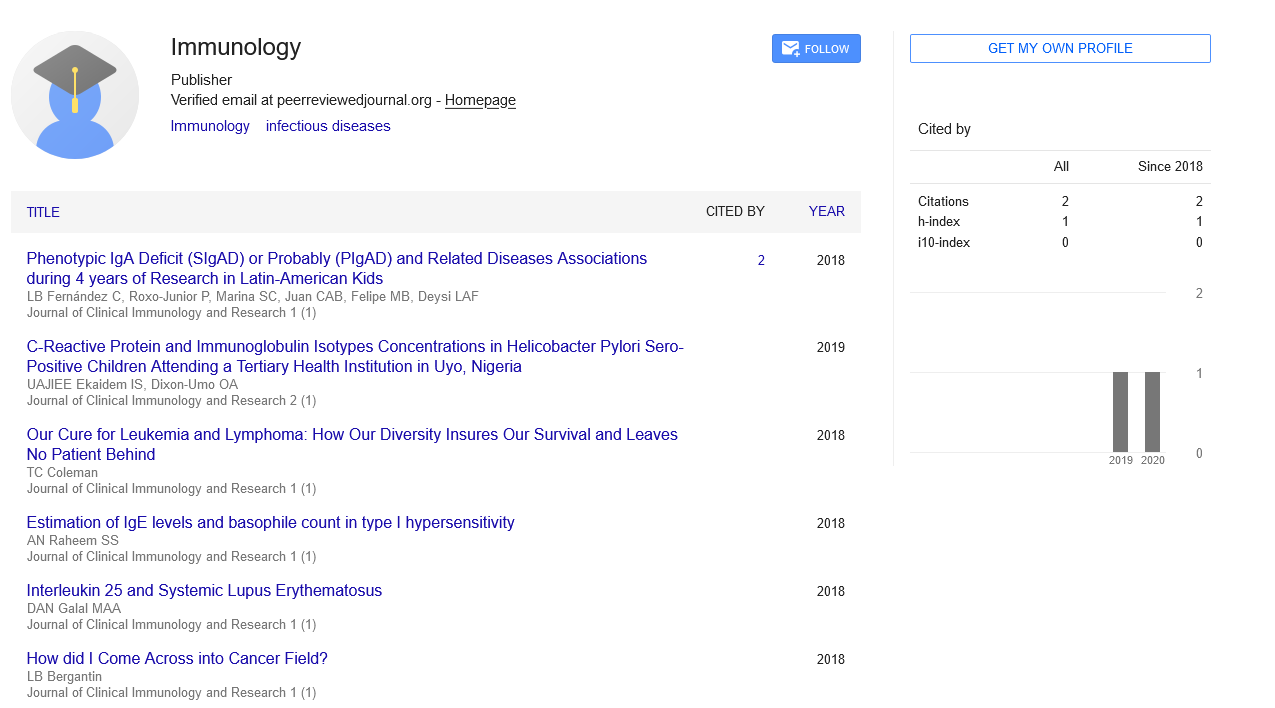Editorial, J Clin Immunol Res Vol: 4 Issue: 5
Immunopharmacology and its Regulation on the Immune System
Jiri Mestecky*,
Department of Microbiology and Medicine, University of Alabama at Birmingham, Birmingham, United States
Corresponding Author:
Jiri Mestecky
Department of Microbiology and Medicine, University of Alabama at Birmingham, Birmingham, United States
E-mail: mesteckyj@ub.edu.in
Keywords: Immune deficiency, Allergy, Autoimmunity
Introduction
The immune system is a composite of the means by which individual organisms maintain their individual integrity in the face of constant interaction with the environment and the continuous internal process of death and removal of host cells that allows for replacement and growth. Both the innate and adaptive divisions of the immune system are critical to the maintenance of homeostasis, physical integrity, and health. Intricately interactive pathways of cells, cell surface receptors, antibodies, and cytokines provide surveillance against invasive pathogens and nonself entities and internal destruction and removal of host senescent cells. The specificity and efficacy of these immune components interacting with their respective ligands provide the mechanistic basis of immune function. Several disease conditions occur upon immune dysfunction including immune deficiency, allergy, and autoimmunity. Chronic immune system activation accompanies essentially all of the myriad of chronic inflammatory diseases that currently plague our species with the manner and degree of immune contribution to these conditions a current area of intense interest and investigation by the biomedical community. Understanding the mechanisms by which the immune system works opens many possibilities for investigations within pharmacology. Objectives are principally three-fold: (a) to enhance function in the face of insufficient immune response, (b) to redirect immune processes that themselves may lead to host dysfunction, and (c) to exploit and/or attempt to mimic the exquisite specificity and mobilizing functions of immune responses in drug development. Immunopharmacology investigators interact extensively with the UA Sarver Heart Center and the Arizona Respiratory Center and are involved in identifying immune mechanisms in chronic inflammatory diseases with special emphasis on those affecting the heart and the lungs. Laboratory based approaches vary from genetic epidemiology, through animal modeling, tissue modeling, ex vivo and in vitro cell biology, to molecular biology. Collaborations also involve translational investigations of evidence-based therapeutic approaches including clinical trials, thus forming bench to bedside and bedside to bench conduits. Immunomodulators include any agent or substance that has an effect on the host immune system. These effects may be stimulatory, suppressive or regulatory. Many drugs, chemicals and microbial products have been identified as having specific as well as nonimmunostimulating properties. The first agent to be used clinically as an immunostimulating drug was Bacillus Calmette-Guerin (BCG). Subsequently, other bacterial derivatives, including Corynebacterium parvum and bacterial lipopolysaccharides, were found to have stimulatory effects. Most research in immunostimulating agents has been done in cancer chemotherapy, where such compounds or preparations have been employed to (hopefully) restore chemotherapeutic agent-induced immunosuppression, and thus prevent the development of community-acquired or nosocomial infections. In contrast to immunostimulants, immunoregulators are traditionally defined as being capable of decreasing an abnormally elevated immune response, and therefore restore defective immune function. However, the differentiation between immunoregulators and immunostimulants is not always clearly defined, as the regulatory effects on the immune system of any particular drug may be multifaceted. Clearly, future research must be directed at defining the specific mechanisms of action of potential therapeutic drugs, and in developing improved molecules to ensure safety and efficacy in the clinical setting. The immune system discriminates self from non-self allowing it to destroy infectious invaders or tumors while leaving normal cells intact. Two components, innate and adaptive provide an early active response and an antigen-specific response, respectively. Innate immunity is comprised of complement, granulocytes, monocytes/macrophages, natural killer cells, mast cells, and basophils, whereas B and T lymphocytes are the main cell types of adaptive immunity. The immune system is of tremendous importance in human disease. Examples of immunological diseases include autoimmune diseases such as type 1 diabetes mellitus and rheumatoid arthritis, malignancies, and asthma and other allergic conditions. Therapies exist and more are being developed to treat these immunological diseases. Drug classes which modulate the immune response act as immunosuppressants or immunostimulants by interacting with specific receptors and cellular components of the innate and adaptive response.
 Spanish
Spanish  Chinese
Chinese  Russian
Russian  German
German  French
French  Japanese
Japanese  Portuguese
Portuguese  Hindi
Hindi 